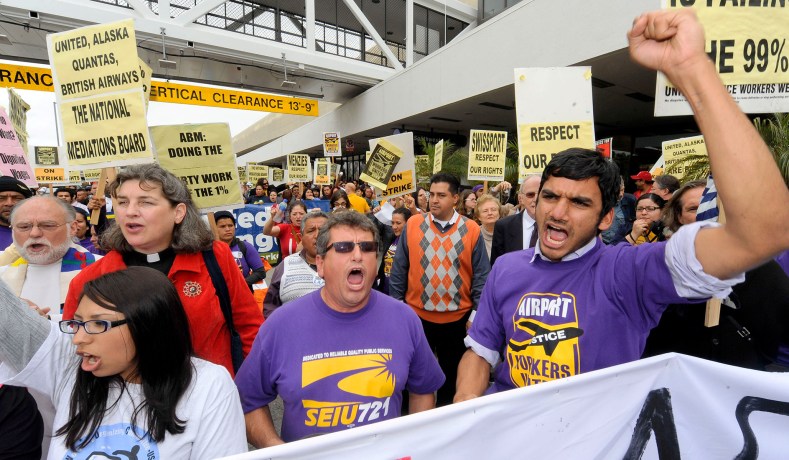Public-sector unions enjoy an exception from the First Amendment. They shouldn’t.
By: David French – nationalreview.com – March 1, 2018
With Janus, the Supreme Court has a chance to right a 40-year-old wrong.
Bad law doesn’t get better just because it’s old. That’s especially true when that bad law violates a core principle of the First Amendment — that the government cannot, must not, compel the speech of free citizens. It can’t compel citizens to say the Pledge of Allegiance in time of war. It can’t compel citizens to drive cars with license plates that say “Live free or die.” And, “except perhaps in the rarest of circumstances, no person in this country may be compelled to subsidize speech by a third party that he or she does not wish to support.”
But don’t tell that to public-sector labor unions and their allies in state governments. For more than 40 years it has actually been legal, thanks to a dreadful Supreme Court ruling, to force state employees to pay substantial fees to public-sector unions to enable those unions to make substantial and consequential public-policy arguments about public-sector employment. That dreadful case is Abood v. Detroit Board of Education, it’s the cornerstone of the coercive power of public-sector unions, and on Monday it came under withering attack from Justice Anthony Kennedy.
It’s about time.
This week the Court heard oral arguments in Janus v. The American Federation of State, County, and Municipal Employees, a case brought by a public employee forced to pay an “agency fee” to a public-employee union so that the union could bargain on his behalf. Some of the exchanges were extraordinary.
But back up a moment. As a general matter, while public employees face greater limitations on their free-speech rights than a private citizen does, when they’re speaking “as a citizen” on a “matter of public concern,” they enjoy substantial free-speech protections. In that case, public employees are free to speak — or to refrain from speaking — much like any other citizen. In other words, simply accepting a public paycheck doesn’t mean that you shed your free-speech rights when you’re not speaking in your official capacity.
Abood, however, has maintained a super-special exception to this rule for public-sector unions. Even though negotiations about wages and working conditions for public employees are matters of public concern, and even though workers negotiating about those wages were acting as “citizens” and not in their official job capacity, the Supreme Court denied workers the First Amendment right to refuse to financially support the union’s political arguments. So shouldn’t regulations for public-sector labor unions be brought in line with the rest of relevant First Amendment law?
Nope. Not according to the unions. To defend agency fees, the union had to make some rather radical arguments — including that union advocacy that implicates the size, scope, and fiscal health of a state or local government should not trigger a conventional First Amendment analysis.
During the oral argument, Justice Kennedy pushed back. He kept highlighting exactly how political — how consequential — public-sector labor unions are. He noted that they argue “for a greater size workforce, against privatization, against merit promotion, against — for teacher tenure, for higher wages, for massive government, for increasing bonded indebtedness, for increasing taxes.” He said, “What we’re talking about here is compelled justification and compelled subsidization of a private party, a private party that expresses political views constantly.”
And in the most quoted exchange of the oral argument, he noted that the unions themselves recognize the immense political stakes of this case:
Justice Kennedy: So you’ve — I can try to find a union newsletter which says don’t worry about the Supreme Court, our political influence will be exactly the same as it was before, if this case comes out against us?
Mr. Frederick: That’s not a chargeable expense, Justice Kennedy. We’re talking about —
Justice Kennedy: I’m asking —
Mr. Frederick: Chargeable —
Justice Kennedy: I’m asking you whether or not in your view, if you do not prevail in this case, the unions will have less political influence; yes or no?
Mr. Frederick: Yes, they will have less political influence.
Justice Kennedy: Isn’t that the end of this case?
Critics have seized on this exchange as evidence of Kennedy’s hostility to unions. They miss the point. The union’s political point of view is irrelevant. It doesn’t matter if it’s progressive or conservative. The question is whether the state can compel citizen support for political advocacy regardless of ideology. If a key issue is that collective bargaining implicates matters not only of “public concern” (it does) but also of raw political power (it does), then the state’s traditional ability to compel a citizen to support a viewpoint he detests shrinks to the “rarest of circumstances.”
To see more of this article, click read more.
Source: Public Sector Unions’ First Amendment Exemption Must End
 Listen Online
Listen Online Watch Online
Watch Online Find a Station in Your Area
Find a Station in Your Area









 Listen Now
Listen Now Watch Online
Watch Online
